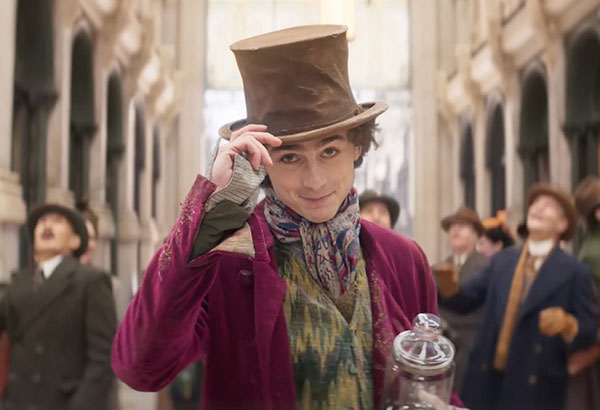From Page to Screen: The Evolution of Willy Wonka
Introduction: A Chocolate-Coated Legacy
Willy Wonka stands as a cultural icon, transcending the pages of Roald Dahl's original 'Charlie and the Chocolate Factory' book. This whimsical character has left an indelible mark on popular culture, captivating audiences young and old.
In anticipation of the release of Wonka – the newest cinematic instalment - let’s delve into the evolution of Willy Wonka from page to screen. We’ll explore the magical journey that began with Dahl's imagination and has since been reimagined in various cinematic adaptations.
The Origins of a Confectionery Genius
Who Wrote Willy Wonka? Unwrapping Roald Dahl's Vision
Roald Dahl: Literary Maestro and Creator
Roald Dahl, born in 1916, was a British novelist, short-story writer, and poet. His experiences, including serving in the Royal Air Force during World War II, greatly influenced his storytelling. Dahl's ability to blend the whimsical with the macabre is evident in many of his works, and Willy Wonka is no exception.
Before Willy Wonka, Dahl had already established himself as a master storyteller with popular children's books such as "James and the Giant Peach" and "The Witches." His unique narrative style, characterised by dark humour and fantastical elements, set him apart in the world of children's literature.
The Enchanting Tale of Willy Wonka
Dahl's inspiration for Willy Wonka can be traced back to his own childhood experiences and imagination. The character of Wonka is a reflection of Dahl's fascination with sweets and chocolates, as well as his penchant for creating eccentric and memorable characters.
Dahl's vision for Willy Wonka goes beyond a simple candy maker; it encompasses an entire magical confectionery world. From the fantastical Oompa-Loompas to the intriguing and sometimes perilous rooms within the chocolate factory, Dahl crafted a universe that captivates readers with its charm and unpredictability.
Author's Intentions and Themes
Dahl embedded moral lessons within the whimsical narrative of Willy Wonka. The story explores themes of greed, kindness, and the consequences of one's actions. The character of Willy Wonka serves as a guide, providing moral lessons wrapped in a delightful and entertaining package.
Dahl's vision for Willy Wonka celebrates the boundless possibilities of imagination. The chocolate factory becomes a canvas for the author to paint a world where anything is possible, and where the ordinary transforms into the extraordinary. Dahl encourages readers to embrace their creativity and view the world with a sense of wonder.
Exploring Dahl's Imagination
Dahl's skill in character development shines through in Willy Wonka's assortment of characters, from the spoiled Veruca Salt to the charming Grandpa Joe. Each character is a product of Dahl's vivid imagination, contributing to the richness and depth of the narrative.
Dahl's attention to detail in describing the chocolate factory and its surroundings immerses readers in a world where rivers flow with chocolate, and candies come to life. The author's ability to paint a vivid picture with words showcases his mastery in creating immersive and enchanting settings.
The First Cinematic Taste of Willy Wonka: 1971's Timeless Classic
Gene Wilder's Portrayal – A Benchmark for Willy Wonka
In the realm of cinematic adaptations, the 1971 film Willy Wonka & the Chocolate Factory marked a milestone with Gene Wilder's portrayal of the enigmatic candy mogul. Wilder's performance not only brought Roald Dahl's character to life but also set a benchmark that would resonate through the years, becoming the definitive interpretation against which subsequent portrayals would be measured.
The Enigmatic Charisma of Gene Wilder
Gene Wilder's Willy Wonka is a masterclass in enigmatic charisma. From the moment he appears on screen, Wilder captures the audience's attention with a perfect balance of whimsy and unpredictability. His portrayal goes beyond the eccentric candy maker stereotype, infusing the character with a magnetic allure that keeps viewers entranced throughout the film.
Embracing the Quirkiness
Wilder embraced the inherent quirkiness of Willy Wonka with unmatched finesse. His portrayal is characterised by a playful yet mysterious demeanour, creating a Willy Wonka who is simultaneously endearing and slightly unsettling. Wilder's ability to navigate the fine line between whimsy and seriousness adds layers to the character, making him a complex and captivating figure.
Iconic Moments and Lines
Wilder's performance is punctuated by iconic moments and unforgettable lines that have become synonymous with Willy Wonka. Whether it's his grand entrance hobbling with a cane before executing a somersault or delivering the famous "You get nothing!" speech, Wilder's delivery is a masterstroke that elevates these scenes to cinematic immortality.
Emotional Range and Depth
Beyond the whimsical exterior, Wilder infuses Willy Wonka with emotional depth. Moments of vulnerability and introspection reveal a more profound layer to the character. Wilder's ability to convey a complex range of emotions, from exuberance to contemplation, adds a richness to Willy Wonka that transcends the surface of a children's fantasy.
A New Flavour: Johnny Depp's 2005 Interpretation
The Artistic Liberties in Reimagining Willy Wonka
Johnny Depp's 2005 interpretation of Willy Wonka marked a significant departure from the classic character created by Roald Dahl and previously portrayed by Gene Wilder. The decision to reimagine Wonka was driven by a desire to infuse the timeless tale with a fresh perspective, and Depp's portrayal became a pivotal element in achieving this goal.
Visually, Depp's Willy Wonka stood in stark contrast to Gene Wilder's iconic version. Depp, known for his eccentric roles, brought a whimsical and enigmatic quality to Wonka's appearance. The character's flamboyant clothing, including vibrant purple tailcoats and a distinctive top hat, reflected Depp's penchant for eccentric and visually captivating characters. The incorporation of quirky accessories, such as oversized sunglasses and gloves, added an extra layer of eccentricity to Wonka's persona, redefining the character's visual identity.
The reimagining of Willy Wonka also extended to the character's personality and demeanour. Depp infused Wonka with a sense of childlike wonder and a touch of social awkwardness, creating a more complex and mysterious portrayal. Unlike Wilder's charismatic and sometimes mysterious Wonka, Depp's version showcased a character who seemed emotionally distant yet harboured a deep connection with the magical world of his chocolate factory. This nuanced approach added depth to Wonka's character, inviting audiences to explore the layers beneath the eccentric exterior.
Thematically, the 2005 adaptation took artistic liberties in exploring Wonka's backstory. The film delved into Wonka's troubled relationship with his estranged father, shedding light on the character's motivations and idiosyncrasies. This narrative choice added a psychological dimension to the story, offering insights into the enigmatic chocolatier's past and providing a fresh perspective on his eccentricities.
The impact of Johnny Depp's portrayal of Willy Wonka reverberated beyond the screen. While some purists questioned the deviation from the source material, others applauded the reinterpretation for breathing new life into a beloved character. Depp's performance contributed to the film's success and ensured that his Willy Wonka would be remembered as a unique and memorable iteration in the pantheon of cinematic adaptations.
Paul King's Recipe for Wonka – A Fresh Perspective
A Story Untold – Focusing on Willy Wonka's Beginnings
In Paul King's highly anticipated adaptation of Wonka, the director takes a bold approach by delving into the untold story of Willy Wonka's beginnings. This decision not only promises a fresh perspective on the iconic character but also showcases King's distinctive cinematic techniques and narrative flair.
King, known for his work on the critically acclaimed Paddington films, has a reputation for infusing his projects with whimsy, heart, and a keen visual style. In "Wonka," he applies these trademark elements to explore the formative years of the enigmatic chocolatier. One of the cinematic techniques King employs is a seamless blend of fantastical elements and grounded storytelling. Much like in the Paddington series, King is likely to create a world that feels magical and whimsical while maintaining a relatable and emotionally resonant core.
The focus on Willy Wonka's beginnings opens the door to a narrative goldmine. King's storytelling prowess will likely be evident in how he weaves a compelling and nuanced origin story for Wonka. By exploring the character's early years, the film has the potential to unravel the mysteries behind Wonka's passion for chocolate, his connection to the Oompa-Loompas, and the inception of his renowned chocolate factory. This narrative depth allows King to create a more complex and layered portrayal of Wonka, offering audiences a deeper understanding of the character's motivations and quirks.
The Everlasting Gobstopper of Cinema
Nostalgia plays a pivotal role in the continued relevance of Willy Wonka. For those who grew up with the book, and Gene Wilder's iconic portrayal, the character represents a cherished part of their childhood. The whimsy of the chocolate factory, the Oompa-Loompas, and the unforgettable golden ticket moments have become ingrained in the collective memory of multiple generations. As a result, the anticipation for each new iteration, such as the upcoming Wonka, is heightened by the nostalgic connection that viewers carry from their past experiences.
But the magic, wonder, and joy associated with the character continue to captivate audiences of all ages. As Wonka approaches, the anticipation is not just for another adaptation but for a continuation of the cinematic enchantment that Willy Wonka has consistently delivered over the years. In this way, Willy Wonka's legacy stands as a testament to the timeless power of storytelling and the enduring impact of a character whose sweet allure remains an everlasting gobstopper in the hearts of cinema enthusiasts worldwide. It’s simply confection in celluloid form that will never lose its flavour.
Wonka releases on the 8th of December.
For more information, watch this space.
Click here for more exiting movie news, and all the exciting new and forthcoming attractions brought to you by Ster-Kinekor.

